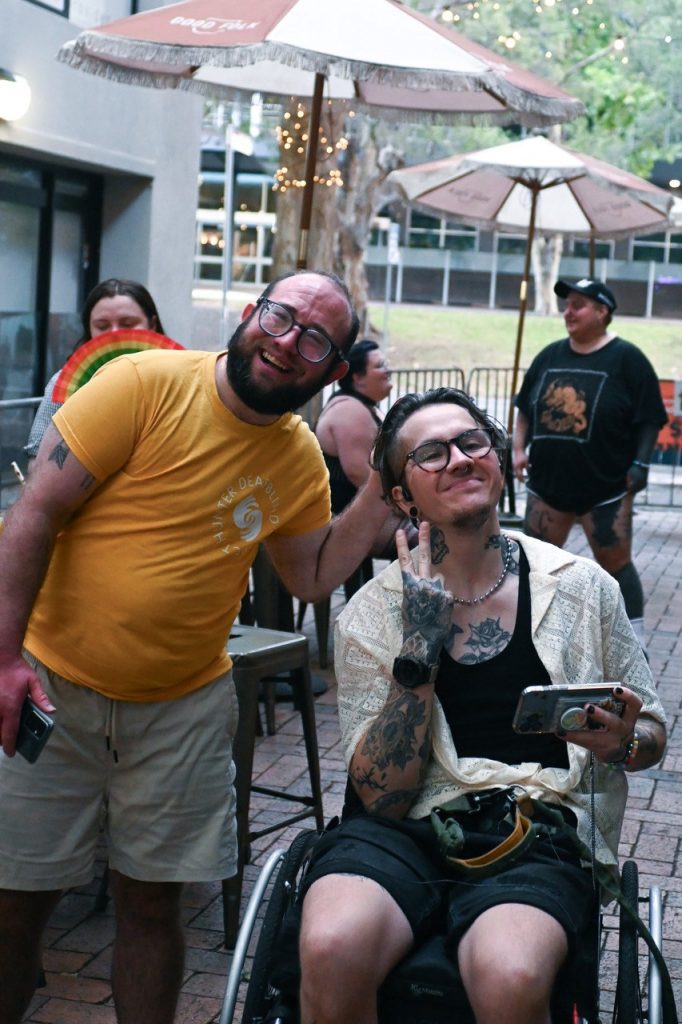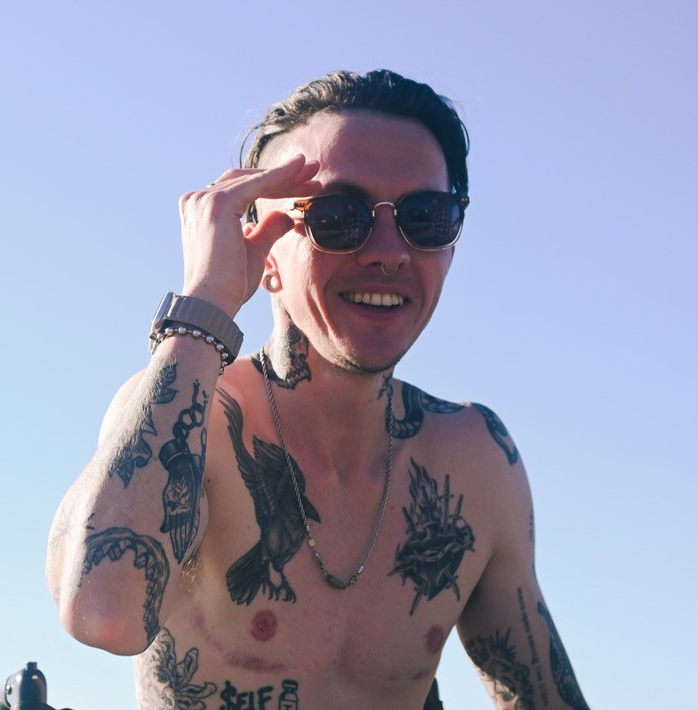The Next Stop: finding my queer, disabled community
I grew up in a regional town. Regional is a slippery word. Here, I use it to mean that my family went camping every Christmas, and the best indication that work had gone back was all the hi-vis and steel caps that people started wearing. The town was objectively beautiful—its centre was built around the silvery spinal cord of a river and most of the buildings, constructed in the mid and late 19th Century, had decorative concrete facades and paintwork latticed by cracks like laughter lines. But despite the tree lined river and the big, open sky—as I began to become aware of my queerness, I started to feel like I couldn’t breathe.
There was only one openly queer kid at my school—a gay boy who was devastatingly handsome and hung out with a posse of popular girls who he wisely sheltered behind like a shield wall.
Besides me, the only other trans person I knew of was a woman who worked at a local cafe and was unrelentingly misgendered by patrons, most of whom refused even to correct themselves. Eventually I had to stop going to the cafe because overhearing this turned my stomach.
I certainly didn’t know any disabled people either. In 2018, I was unexpectedly diagnosed with a brain tumour, and the subsequent surgery went dramatically wrong and resulted in a significant brain injury. The body that I suddenly found in my reflection—with crossed over eyes and legs that didn’t work properly—was one that didn’t even remotely resemble any I’d seen before.
In 2023, I applied for a paid writing scholarship in Newcastle, and barely even entertained the idea that I’d be successful. But somehow, I was. The scholarship meant commuting from my sleepy little town to the more metropolitan Newcastle. I scheduled a wheelchair taxi to take me to the train station each day, early, when the morning had still yet to shake off that crystalline hush. Given the gargantuan size of this country, the distance I needed to travel was relatively conservative: the trip was only forty minutes, thirty-five kilometres, $2.50 on my concession Opal card. I remember that first day in glittering high definition:
The train pulling into Newcastle Interchange was announced by the thunk of the platform staff putting down the wheelchair ramp. I rolled down behind sharply dressed business people, silently ecstatic at being among them. The sun had fully risen now, and little starbursts bounced off the fingernail I wore painted with glitter, and I was aware of the light settling in crisp lines along the broadness of my shoulders, the square of my flat chest. I consulted my phone to find the office (an office!) and used my new lanyard to tap in. Inside, there was the smell off coffee and people smiling and greeting me by name.
After that first, momentous day, the train journey came to represent a staggering lurch through my life. Each time the doors sighed open I recalled moments of my life at different ages, like photographs on a string:
High St: 5 years old. A wild tomboy with bare feet black with grime.
East Maitland: 10 years old, the “pink” twin jumping between the black floor tiles at the local Westfield.
Beresfield: a moody 14 year old with the beginnings of acne, not sure why she hates looking at her naked skin in the shower.
Warabrook: 20 years old: an undergraduate already wearing a ceramic-thin smile, already with the scars on their thighs but not yet the ones on their chest.
Between stops, my mind wanders to the hospital: the fluorescent lights, the sharp smell of antiseptic, the hard edge of fear that is always with me now, like goosebumps on my skin. Even though the doors will not open on this memory, somehow it is still a part of the future waiting for me at the end of the line.
During my lunch break, I often message Bryson—my friend, who is now my housemate, who it feels wrong to describe without the word “brother”—about hanging out. When the working day is finished, I take the light rail down to Bernies, the local queer bar, to meet him for a beer.
When we come through the door, a member of the staff will say: Our most handsome Clients, and I feel full of helium.
I met Bryson at one of the meetings of ‘Queer Peers’, one of the groups run by ‘Community Disability Alliance Hunter’ (CDAH), a peer-led disability justice organisation with an office a couple of blocks away from Bernies. I became involved with them almost four years ago now, and I still can’t help but smile when I go through the door.

Connection with community is essential for people who identify as queer or otherwise different. We need to see other people like us, living lives similar to our own, to know that those lives are feasible. Our community tells us that there is a life waiting for us, bolder and brighter, where even the light will feel different.
I try not to think about what my life would have been like if I hadn’t had the unlikely confluence of privilege and luck that put me on that train. I try not to think that the journey feels kind of like exile, I try not to think of the words written by Richard Wright in 1940, ‘We divided up the world and said stay there’, and I try not to think: has anything really changed?
Instead, I try to think about how there are more and more rainbow stickers popping up in the storefront windows of my hometown, like a flung handful of confetti. I try to think about how some of them even have ramps.
I try to think about how, one day, this kind of life might always seem possible; how one day, young people like me might not need to catch a train to know that they have a future.
I try to think about how things are changing, and how I, we, can help it happen.
Az is a 27 year old trans wheelchair user and an emerging writer of both fiction and non-fiction. His work has appeared in such publications as Voiceworks, Archer, Overland, and the Australian Short Story Festival anthology ‘Strangely Enough’. He is currently completing a Masters of Literature and also has a Bachelor of Biomedical Science (go figure). In 2023, he was one of the ABC Regional Storyteller Scholars, and recently became the facilitator of the Writers Group run by Community Disability Alliance Hunter (CDAH) in Newcastle. He is a self proclaimed “artsy fart” and also enjoys photography. When he’s not making art, he’s listening to audiobooks, working out or making kissy sounds at his dog.
He’s got an unhealthy relationship with the Gram and can be found @wheelyboy_az
A list of his published works can be found here.
